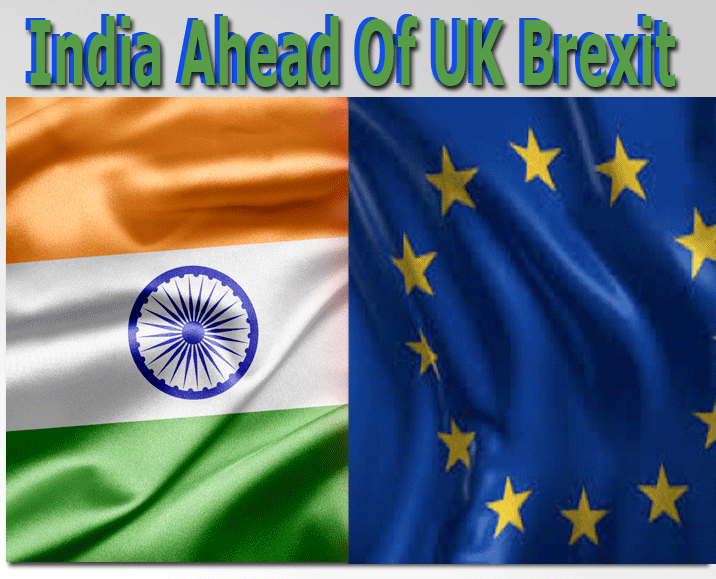
As the deadline of
March 29, 2019 approaches and Britain gets ready to step out of
the 28-member European Union, there is pressure on India to strengthen
business ties with the EU. Overtures
from France and Germany have been coming regularly. At the beginning of
this year, French President Emmanuel Macron was in India. During the visit,
a total of €13 billion in investment deals was signed.
Leaves No
Stone Unturned
Soon after that “French Connection”
came the German President, Frank-Walter Steinmeier. Speaking at Delhi
University, the President made it clear, that “with our French partners,
we can become India’s new strategic anchor on the European Continent
and in the European single market”.
Looking Out For Number One
Indeed, there is reason enough. According
to the European Commission, the EU is India's number one trading partner
(13.5 per cent of India’s overall trade with the world in 2015-16),
well ahead of China (10.8 per cent), USA (9.3 per cent), UAE (7.7 per
cent) and Saudi Arabia (4.3 per cent). The value of EU exports to India
has grown from €24.2 billion in 2006 to €37.8 billion in 2016,
with engineering goods, gems and jewellery, other manufactured goods and
chemicals ranking at the top.
Similarly, the value of EU imports
from India has also gone up from €22.6 billion in 2006 to €39.3
billion in 2016.
Europe Takes
India Out To Launch
Trade talks between the EU and India
have not gone well over the years but with the impending deadline, India
is keen to revive relations with Europe.
For the moment, the EU authorities
are content that Britain – long considered a “launching pad”
for Indian businesses for an entry into Europe – will no longer
be in the picture.
In these circumstances, what then
does the future hold for the air cargo business?
Future According
To EU
According to the ‘Annual Analyses
of the EU Air Transport Market 2016’ (for air freight flows from/to
Europe for 2016-2035) for European exports carried by air, the Indian
subcontinent and the various Asian emerging economies will be the key
growth end markets, with 6.1 per cent and 6 per cent per annum, respectively.
For imports, the flows from Central America and the Indian subcontinent,
will show the highest growth rates, with 4.1 per cent and 3.8 per cent
per annum, respectively.
For the moment, although there is
a feeling of uncertainty since no trade deal between India and the EU
has been arrived at, international carriers are upbeat. There are a number
of scheduled direct flights with cargo capacity to London, Frankfurt,
Munich, Paris, Amsterdam, Madrid, Helsinki and Luxemburg. In fact, European
carriers have enhanced uplift capacity through scheduled passenger flights
and freighters.
This was in addition to the already
high volumes being transported by the Middle Eastern carriers. Indian
exports to European countries totals around 30,000 tons per month.
Of this, Delhi’s Indira Gandhi
International Airport alone does around 6,500 tons per month.
 Turkey
Natural Partners Turkey
Natural Partners
Turkish Cargo the natural partner
for India in both Europe and Asia is keen to expand business for and with
the subcontinent as UK Brexit looms in March 2019.
Recently, Turkish Cargo commenced
flights to Bangalore, that has a high annual export potential of 170 thousand
tons annually.
“With our understanding of world
markets and Istanbul’s great centralized position as gateway to
both Europe and Asia, we have great hope to connect Bangalore’s
central position in the production of the aerospace industry, IT industry,
computer and hi-tech products to the world,” Turhan Ozen, Turkish
Chief Cargo Officer told FlyingTypers.
“Bangalore also exports pharmaceuticals,
perishable goods (fruits and vegetables), electronic, engineering, valuable
items and textile products.”
“All of this activity is well
connected to our growing air cargo enterprise driven by our all-new cargo
center scheduled to open at New Istanbul International Airport next year,”
Mr. Ozen declared.
According to WACD (World Air Cargo
Data) Turkish Cargo has achieved a 29% jump in revenue and 25% surge in
transported cargos between January and September in 2018 compared to the
same period last year, ranking 8th in the world of air cargo service providers.
Marching
Forward
Freight forwarders too are optimistic.
Europe is a big consumer for pharmaceuticals, gems and jewellery, automotive
components, etc. Additionally, a weak Chinese Yuan has further opened
the doors for India-manufactured goods.
While the ripple effects of Britain’s
exit and its impact on the Euro and the UK Pound will be there, the Indian
freight forwarding community believes it will not have serious consequences
that could affect business deal between India and European countries.
Tirthankar Ghosh |





